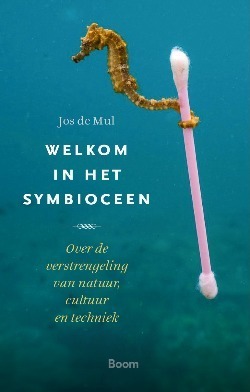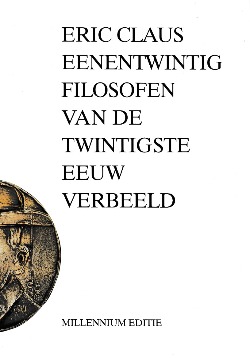Jos de Mul. Théo van Doesburg 2.0. What is Data? In: Mieke Gerritzen et al. From Dada to Data. Breda: Museum of the Image (MOTI), 2016, 23.
théo van doesburg 2.0: What is Data? (Publisher: “No Style” The Hague, 2023).
You will probably be surprised to be hearing something about Data from someone who is innocent of Dataism, from a non- DataistData: the terror of the stock market gurus, of the privacy seeker, the designer, the cultural entrepreneur, the Gutmensch — of everybody?
A subject such as this is perhaps least suitable for a serious lecture, which is not at all what I have in mind.
I will be satisfied if, as an obligation to friends, I can illuminate the Dataistic attitude to life. This seems to me especially important in a country that has been hermetically sealed against any new expression of life since the 60s.
It would indeed be pretentious if I was under the impression that I could make the mystery of Data intellectually intelligible.
This is impossible and something not even the Dataists themselves achieved.
Data is a screen.
Data wants to be lived.
Data does not desire any intellectual comprehensibility.
Data, according to Richard Huelsenbeck, lets creeds run through its fingers; Data is the dancing spirit atop the world’s morals. Data is the great parallel to the relativistic philosophies of our times; Data is not an axiom; Data is a state of mind independent of all schools and theories, one that addresses individuality itself without doing violence to it. One cannot reduce Data to principles.
The answer to the question “what is data” can only be given by spontaneous action. To think that Dataism belongs to the category of new art forms such as video games, digital art, computer animation and cyborg art etc. is a mistake.
Data is not an art movement
Data is a basic movement of life, opposed to everything that we imagine to be of vital importance.
Data asks no questions at all. Data is the denial of the current everyday sense of life.
Data is the strongest negation of all cultural valuations.
The true Dataist adopts no position, either in art, in politics, in philosophy or religion.
Each brand is attractive only until a new one is discovered.
According to the Dataist, humanity, because of fetishistic instincts, is inclined to let itself be blinded by certain familiar signboards which serve as advertising and are repeated so many times as to produce an indelible impression. Religion uses the cross, Apple its logo, Facebook its likes, Kurzweil his singularity. Data does not want to make converts.
Data sees in every dogma, in every algorithm, a nail with which we try to hold together a decayed, sinking boat (our human lifeform).
Data is the most immediate expression of our formless age and wants to be that as well. Data could be called the anational expression of the collective life experience of humanity over the last ten years.
That which remains latent in postmodern man, finds expression in Data.Data has always existed but was first discovered in this period.
DATA has no fatherland and no nationality. It came about suddenly in various dispersed places: America, Switzerland, France, Germany etc., from a general need for spiritual self- purification.
DATA — as Picabia writes — feels nothing, it is nothing, nothing, nothing.
It is like your hope: nothing.
Like your idols: nothing.
Like your paradise: nothing.
Like your politicians: nothing.
Like your heroes: nothing.
Like your artists: nothing.
Like your religions: nothing.
Data was not made, but came into being.
One cannot become a Dataist, only be one.
The attempts of Gates, Jobs, Zuckerberg and others have come to nothing. Data abandons all experiment aimed at ordering the endlessly variable, chaotic and heterogeneous mass that is called mankind.
Data rejects evolution. Every movement engenders a counter-movement of equal strength which cancel one another out. Data has completely abolished the generally accepted duality of man and woman, matter and spirit, reality and virtuality, and hereby created the “point of indifference”, a point above all human comprehension of time and space.
By this means, Data possesses the ability to make mobile the fixed view and the vanishing point, which kept us imprisoned in our (three- dimensional) delusions. In this way it became possible to see the entire prism of the network in one go rather than one facet. With respect to this, Data is one of the strongest manifestations of the fourth dimension, transposed on to an avatar.
For every “yes” Data simultaneously sees the “no”.
We postvitalist Dataists, destructive constructivists, have laid bare the complete ulceration of the world’s network, crying "Look, look, look, here, here, here, nothing, nothing, nothing.” Without a firewall raised over our heads, we would feel disturbed from the rest that we enjoy. What we guard the closest — as Datasophy teaches us — are our digital dreams. Through careful regular use of these antidepressants , we fail to recognise the fact that the whole of life is decorated with frills of mud. No matter how thick the walls with which we close ourselves off from nature, after time the most exactly wrought product of our spiritual delights shall be eaten away catapeptically.
Now do you know what “Data” is?
Virtual text of Théo van Doesburg (1883-1931), found by Jos de Mul in an abandoned database in a corner of the digital universe. There he also found Michael White’s English translation of Van Doesburg’s 1923 ‘Wat is Dada?’ lecture, which he DaTaManipulated with kind permission of the translator.










